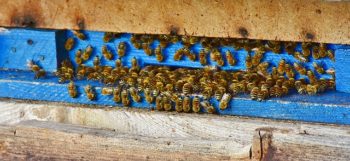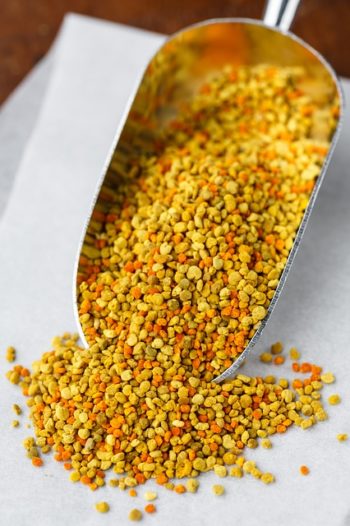When raising and caring for honey bees I am always trying to learn new information and stay educated regarding best beekeeping practices. One idea that keeps surfacing during my research involves the harvesting of pollen from one’s beehives. The first time I read about this I thought it was crazy, and wondered if it could possibly be a good thing to attempt. The simple answer is that it is possible to collect pollen from bees, and that there is actually a market for bee pollen. Additionally, if done correctly, it will not cause harm to your bee community.
The collection of pollen from your bee hives requires planning, proper equipment, and work. In this article I will let you know what I have found out about collecting bee pollen and what you will need to consider before you try attempting it.
Bee Pollen
As many people know bees are spend their entire lives working and gathering for the benefit of their hive. Bee pollen is a major resource for the bee colony. The pollen is especially important for raising a new brood. It takes a massive amount of protein to create new bees and pollen is the source of that protein.
Once gathered by the workers bees, the pollen goes through quite a process after being brought into the hive. Most simply stated, the bees put the pollen through a packing and storing process that transforms it into bee bread. I wrote an article about bee bread here. The entire process of how bees create silos for pollen storage is incredibly fascinating.
Similar to honey, the pollen is stored in comb cells and used for the food of the colony like honey. Honey is the carbohydrate source, and the pollen is the source of protein, with bee bread being the final product of the pollen.
Honey has been harvested for centuries with bee colonies doing fine even after their hard earned honey is taken. This requires the beekeeper to think ahead and plan for nectar flows and dearth, or winter, weather, drought, etc. If managed well a colony can provide plenty of honey for the colony as well as a good beekeeper. If done poorly harvesting honey can lead to the death of a bee colony.
It takes a new level of caution when tampering with the protein intake of a hive. More planning, equipment, and observation is needed to have your colony survive and hopefully thrive.

Why would you want to collect bee pollen?
I understand the concept of collecting honey. Honey is a great natural sweetener. It has a great deal of microbiota properties that are still being discovered as research continues. The methods and techniques of harvesting honey have been perfected over the years and can be learned fairly easily.
The idea of harvesting pollen however, is still fairly new, and has not been emphasized or developed nearly as much as collecting honey. From what I have gathered, there are good reasons for collecting pollen.
The first reason for bee pollen gathering is for supplementation of a colony in the spring after a winter season. I can see that supplying a struggling colony with plenty of pollen would give a valuable resource to build up brood. Gathering pollen from a strong hive for use in times of need seems fairly plausible. I do know that the bee bread is a better form of pollen, but I would suspect that any struggling colony would welcome pollen even if it hasn’t been processed into bee bread.
The second reason for collecting pollen is for human consumption. It is reported that bee pollen may be a good health supplement for many aspects of the human condition. However, many of these health claims are yet to be proven scientifically. It is interesting to note that as research instruments and methods become more precise and better overall, they are able to debunk and prove nutritional benefits of all kinds of things including products of honey bees.
There have been many holistic practitioners and followers that have been using bee pollen for years. The claimed holistic uses and benefits of bee pollen are really interesting.
Some of the reported benefits of bee pollen are:
Allergy Treatment: Bee pollen has been used as an allergy treatment for years. The ingestion of small amounts of pollen over time is similar to the widely accepted treatment of having shots of pollen injected in patients over time. The effectiveness is when locally gathered pollen can be used to aid in the treatment because the allergen is generally local. Ingestion of honey is said to have this kind of affect as well. A study about allergy treatment with bee pollen is linked here.
Anti Inflammatory: According to the US National Library of Medicine and National Institutes of Health, the mixing of bee pollen with honey created significant anti-inflammatory activities with induced liver necrosis. Here is a link to the study.
Another study conducted by the US National Library of Medicine and National Institutes of Health showed some anti inflammatory activity with edema. Here is the link to the study.
Wound and burn treatments: Pollen has been shown to aid in wound and burn treatment. The link for the study is here.
Anti Depressant: The administration of bee pollen shows gradual mood improvement and desire to live. Study link here.
Aid in health and protection of the liver: The study is here. It shows that bee pollen is a safe treatment for liver injuries.
Anti-Oxidant: This study used bee bread instead of bee pollen, but it shows some interesting findings about remarkable anti-oxidant properties that the bee bread has.
Lowering Cholesterol: Animal studies have shown that bee pollen lowers cholesterol. The link to the articles are here and here.
Anti Cancer Properties: Studies have shown that bee pollen inhibits the growth of tumors and aids in treatment of cancer. The study is here.
Vitamin and Mineral Supplement: The chemical breakdown of bee pollen does include many vitamins and minerals. These nutrients can be difficult for the body to break down and use with the tough outer shell of the pollen. Also, different sources of pollen will have different amounts of nutrients. Create a uniform measurement of the total nutritional value of pollen is difficult due to all the variables.
Other claims without any scientific studies include:
- Weight Management and weight loss.
- Stress Relief
- Improved immunity
- Menopausal Symptom treatment
Reasons to not collect bee pollen.
The major reason for not collecting pollen would be the stress on the bee colony. It takes a lot of work to collect enough nectar to create honey. It takes a lot of work to collect pollen and create bee bread. Whenever a beekeeper takes resources from the bee colony it creates a stress on the colony.
When a bee colony loses its stores of honey they immediately change their activities to restore the honey lost and prepare for the winter, or a future dearth of nectar. They will scramble all over and many beekeepers will feed their bees sugar water in the fall after the honey harvest. This will ensure the supply of food for the winter.
When a bee colony doesn’t have the stores of pollen or bee bread, they change their whole tack and resort to stress mode. Nurse bees will devour brood utilizing the brood as a protein resource. An interesting series of articles can be found here about this here. Randy Oliver takes a scientific approach to beekeeping and has a lot of great information.
So, the main reason for not collecting pollen for me would be the added stress put on the bee colony. The stress lack of pollen coming in will result in more bees needing to collect pollen instead of nectar resulting in less honey production. This can be fine if you want pollen more than honey from your hive, you just need to plan ahead for that kind of a result. I also worry about weakening the hive that already has a lot of challenges to deal with such as: pesticides, predators, vandals, theft, varroa mites, tracheal mites, viruses, inept beekeeping practices, etc.
How do you collect bee pollen?
The collection of bee pollen is quite different than pulling honey from frames or comb. The idea is to collect the pollen before it gets into the cells of the hive. There are a few different devices for the collection of pollen. They are referred to as pollen traps. The idea is to trap the pollen and get it as the workers return to the hive.
There are several pollen traps available. I will have a list of pollen traps that are recommended on our resource page. The one that I am looking at using is the Harvest Lane Honey Plastic Pollen Trap.
Care is needed in collecting and storing bee pollen!
It’s quite a process for bees to collect pollen. The bee itself becomes positively charged with static electricity when flying through the air. The pollen in the blossoms and flowers is negatively charged and will stick to the small hairs that are all over the bee. The bee will groom itself and move the pollen from all over its body to the back legs to what is referred to as the pollen baskets. As they do this the bee will regurgitate some nectar and digestive juices to keep the pollen together. This aids in keeping the pollen attached and packed tightly.
When the bee comes back to the hive the pollen trap will scrape off the pollen as the worker tries to get back in the hive. The pollen grains will drop to the bottom of the trap for collection. You need to collect the pollen quickly after it has been taken from the bee. The pollen will degrade quickly! You need to act fast to collect the pollen and store it properly or you will lose most of the beneficial attributes that you are looking for.
The most common method is to freeze the pollen grains and store them frozen. The method of freezing needs to be where you spread out the pollen to freeze quickly and all at once. If it is bunched up the moisture in the pollen could grow mold or yeasts that can ruin the pollen. Care must also be taken to keep the pollen out of the sunlight. The UV rays quickly degrade the pollen as well. A common practice is to collect the pollen once or twice daily.
Summary
So, from what I have learned bee pollen is a good consideration for a beekeeper to harvest. I would use a lot of caution and observation when practicing pollen gathering. It does add more stress to a bee colony and probably should be done with a string hive instead of one that struggles. As a beekeeper you need to be prepared for a reduction in honey as worker bees get tasked to gather pollen instead of honey.
Honey bee pollen can provide some interesting supplementation for some pretty good health benefits. There is also a good market for bee pollen. You can charge a premium for localized pollen and it’s benefit for allergies.

